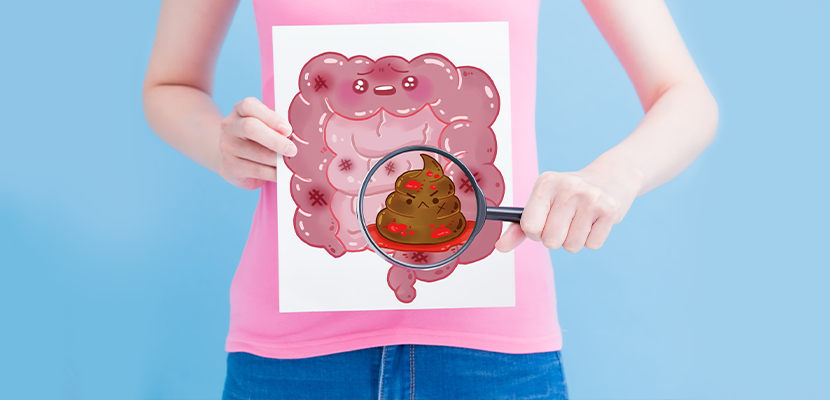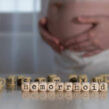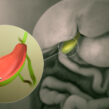Noticing blood in the toilet after emptying your bowel can be terrifying. You might begin to wonder what the reason behind it could be.
This article lists the possible causes of blood in stools.
Table Of Contents
About Blood in Stools
The presence of blood in stool usually suggests that there is bleeding in some part of the digestive tract. Blood may appear in the water of the toilet bowl, the tissue used to wipe, or blood may cover the stool.
The appearance and colour of the blood in the stool may suggest the possible causes:
- Bright red blood suggests bleeding in the lower part of the colon or rectum.
- Maroon or dark red blood means bleeding in the upper part of the colon or in the small intestine.
- Dark and tarry stool indicates bleeding in the stomach, probably due to ulcers.
Sometimes, the amount of blood in the stool is less, which can be assessed only by a laboratory test called faecal occult blood test.
In most cases, blood in stools does not indicate any serious condition. However, it is advised to seek an opinion from a healthcare provider to identify the underlying cause and treat it accordingly.
Causes of Blood in the Stool
Blood in stool is a symptom of several medical conditions, ranging from mild rectal bleeding to a sign of colorectal cancer. Some of these conditions require immediate medical treatment.
Below are the possible causes of blood in stool:
Haemorrhoids: This is the most common cause of blood in stools. Haemorrhoids are swollen blood vessels present in the rectum or the anus. Haemorrhoids can cause itching, pain and bleeding in the rectum or anus. Individuals who have haemorrhoids may have bright red blood that coats the stool or in the toilet.
Haemorrhoids can occur due to straining during bowel movements, chronic constipation, lifting heavy objects, pregnancy, anal intercourse, and obesity.
Anal fissure: An anal fissure is a tear or split around the anus. This can happen while trying to pass large, hard stools, which requires extra pressure on the bowel. This can result in the skin to tear or split open and cause bleeding. Along with bleeding, an anal fissure can cause a lot of pain and a sensation of tearing, ripping or burning after a bowel movement. Mild anal fissures usually resolve on their own with time.
Diverticulitis: Diverticula are small pouches that protrude from the walls of the weakened sections of the intestine. These pouches cause bleeding and infections. Infection of the diverticula can cause Diverticulitis with symptoms like fever, abdominal pain, and a sudden change in bowel habits.
Ulcers: These are open sores formed in the lining of the stomach or duodenum (the upper end of the small intestine). Sores can occur when the amount of digestive fluid in the intestine is out of balance, which can damage the inner lining, or by an infection caused by a bacterium called Helicobacter pylori (peptic ulcers). Ulcers can bleed and turn the colour of the stool black and give a tar-like appearance.
Inflammatory bowel disease (IBD): IBD is the swelling of the small or large intestine. IBD is of two types – ulcerative colitis and Crohn’s disease. In ulcerative colitis, the large interesting is inflamed, whereas in Crohn’s disease, several patches of the digestive tract lining can swell. IBD may present with symptoms such as abdominal pain, diarrhoea, fever, cramping, intestinal blockages, and rectal bleeding.
Anal abscess or fistula: Small glands are present in the anus to help pass the stool. These glands can be infected, which can result in abscess or fistulas. An abscess is the build-up of pus in the gland that causes blockage. This abscess is connected to the skin around the anus via a tiny tunnel called the anal fistula. Anal abscess or fistula can occur due to tuberculosis, inflammatory bowel disease or radiation treatments and cause bleeding.
Large polyps: Polyps in the colon are mushroom-like benign growths that are formed in the lining of the colon and protrude on the outer side of the bowels. These polyps can cause bleeding. Polyps, if left untreated, can grow and lead to colorectal cancer. If you are at risk of colorectal cancer, regular screening can help detect the cancer at an early stage, which is essential for its successful treatment.
Blood in stools can also occur due to:
- Angiodysplasia: Fragile, abnormal blood vessels cause bleeding
- Oesophageal problems: Tear or varicose veins of the oesophagus can lead to severe blood loss
- Food poisoning: Several foodborne organisms can lead to bloody stools
Consuming certain foods can also make the stools have an unusual colour. Eating foods with strong colour pigments or having foods that have natural colour can impart different colour to the stools. These foods include beets, black licorice, red gelatin and dark berries. This can be confused with blood in stools. If your poop appears dark or has an unusual colour, recall what you ate recently. If you didn’t eat any coloured foods, consult a doctor and get properly diagnosed.
Contact us
If you notice blood in stools or any unusual bleeding in the rectum, email or call us. Our gastroenterologist, Dr. Parthasarathy, will help you find the underlying cause and provide appropriate treatment.
Dr. Parthasarathy is one of the most renowned surgical gastroenterologists in Hyderabad, India. He has about 15 years of experience and has performed 3000+ advanced laparoscopic procedures. He has been trained by the best institutes of the country and abroad.



